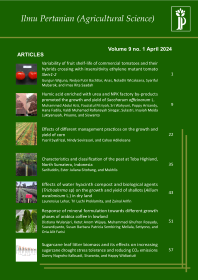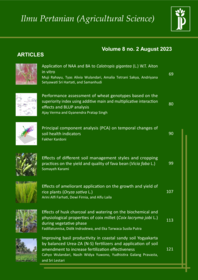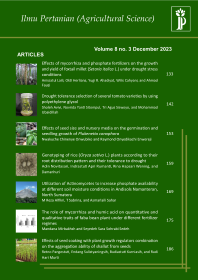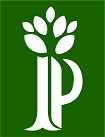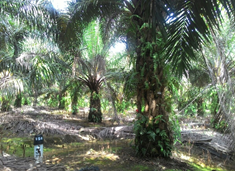
Effects of Urease Inhibitor and Nitrification Inhibitor on the Nitrogen Losses, Physiological Activity, and Oil Palm Yield on Red-Yellow Podzolic
Melisa Melisa(1), Eka Tarwaca Susila Putra(2*), Eko Hanudin(3)
(1) Faculty of Agriculture, Universitas Gadjah Mada, Yogyakarta
(2) Faculty of Agriculture, Universitas Gadjah Mada, Yogyakarta
(3) Faculty of Agriculture, Universitas Gadjah Mada, Yogyakarta
(*) Corresponding Author
Abstract
Nitrogen (N) fertilizer efficiency can increase by adding N-(n-butyl) thiophosphoric triamide (NBPT) and N-(n-propyl) thiophosphoric triamide (NPPT) as urease inhibitor in urea fertilizer and adding 3,4-dimethyl pyrazole phosphate (DMPP) as nitrification inhibitor in ammonium sulfate (ZA) fertilizer. The research objectives were to examine the effectiveness of urease inhibitor (NBPT and NPPT) and nitrification inhibitor (DMPP) on the physiological activity and oil palm yield on red-yellow podzolic. Field experiment was done using a Randomized Complete Block Design (RCBD) of single factor and three replications as block. The single factor was nine fertilization treatments of urea with or without urease inhibitor, and ZA with or without nitrification inhibitor. The use of urease inhibitors decreases the amount of volatilization and N loss fertilizer. The higher dose of broadcasting N fertilizer (on the same type of fertilizer) resulted in the higher amount of N loss and volatilization. All fertilization treatments did not have any significant influence to the width and the length of opening stomata, nitrate reductase activity (NRA), N concentration in oil palm leaf, Oil Extraction Rate (OER), and Free Fatty Acid (FFA). Meanwhile, The oil palms at yellow red podzolic applied with urea 195 kg/ha combined with 0.12% of NBPT-NPPT resulting in higher fresh fruit bunch productivity.
Keywords
Full Text:
PDFReferences
Bastos, L. M., R. Ferguson. 2015. Urease inhibitors effect on ammonia volatilization and corn grain yield. Lincoln: University of Nebraska.
Corley, R.H.V., P.B. Tinker. 2003. The oil palm 4th ed. United Kingdom: Blackwell Scientific.
Fauzi, Y., E. Widyastuti., I. Sastyawibawa dan R. Hartono. 2002. Kelapa sawit : Budidaya, pemanfaatan hasil dan limbah, analisis usaha dan pemasaran edisi revisi. Jakarta: Penebar Swadaya.
Hakim, N.M., Y. Nyakpa., A.M. Lubis., S.G. Nugroho., M.R. Saul., M.A. Diha., G.B. Hong., H.H. Bailey. 1986. Fundamentals of soil science. Lampung: UNILA.
Hakim, M. 2007. Oil palm, agronomic technical and management. Jakarta: Indonesia Fertilizer.
Handayani, F. 2015. The impact of the oil palm agriculture industry on fish loss in waters and flora and fauna. National Journal of Ecopedon, JNEP., 041-045.
Hardjowigeno, S. 2007. Soil science. Jakarta: Akademika Pressindo.
Iqbal, A. 2008. Potential of compost and manure for organic rice production in inceptisol. Journal Akta Agrosia., 11:13-18.
Jannah, N., A. Fatah and Marhannudin. 2012. The influence of various types and doses of compound NPK fertilizer to the growth of oil palm seedlings (Elaeis guineensis Jacq). Media Sciences., 4:48-54.
Jones, J.B. 1998. Plant nutrition manual. New York: CRC Press.
Kasim, M.H., Taryono., S. Waluyo., H. Kartiko. 2013. The dynamic of nitrate reductase in tea leaves. Agricultural Science., 16:90-98.
Kearn, E.V. and S.M. Assmann. 1993. The guard cells environment connection. Plant Physiology., 102:711-715.
Kiswanto, J.H., Purwanta dan B. Wijayanto. 2008. Oil palm cultivation technology. Bogor: Institutions for Agricultural Technology.
Lawlor, D.W. 2002. Limitation to photo synthesis in water-stress leaves: stomata vs metabolism and role of ATP. Annals of Botany., 89:871-885.
Menéndez, S., I. Barrena., I. Setien., C. González-Murua., J. María Estavillo. 2012. Efficiency of nitrification inhibitor DMPP to reduce nitrous oxide emissions under different temperature and moisture conditions. Journal of Soil Biology and Biochemistry., 53:82-89.
Nainggolan, G.D., Suwardi., Darmawan. 2009. Pattern of nitrogen release from slow release fertilizer of urea-zeolite-humic acid. Journal of Zeolit Indonesia., 8:89-96.
Nurjaya. 2009. Oil palm in main nursery through leaf analysis using DRIS method. Bogor: Proceeding of Soil Research Institute.
Pahan, I. 2010. Textbook to oil palm. Jakarta: Penebar Swadaya.
Pahan, I. 2006. Textbook for oil palm management agribusiness from upstream to downstream. Jakarta: Penebar Swadaya.
Risza, S. 2010. The future of indonesian oil palm plantation. Yogyakarta: Kanisius.
Roberts, T., R. Norman., N. Slaton., L. Espinoza. 2016. Nitrogen fertilizer additives. http://www.uaex.edu.
Sanchez, P. A. 1979. Properties and management of soil in tropics. New York: Jhon Wiley and Sons.
Shen, Z., Y. Liang and K. Shen. 1993. Effect of boron on the nitrate reductase activity in oilseed rape plants. Journal of Plant Nutrition., 16:1229-1239.
Solomonson, L. P. and M.J. Barber. 1990. Assimilatory nitrate reductase: functional properties and regulation. Annual Review of Plant Physiology. Plant Molecular Biology., 41:225-253.
Sutarta, E. S., S. Rahutomo, W. Darmosarkorodan., Winarna. 2003. The role of nutrients in the fertilization of oil palm crops, p. 81-92. In: W. Darmosarkoro, E. S. Sutarta dan Winarna (ed.). The land and fertilization of oil palm. Medan.
Suter, H., D. Chen., C. Walker., R. Davies. 2012. The potential for inhibitor coated nitrogen fertilisers to reduce agricultural fertiliser N losses. Australia: Proceedings of the 16th ASA Conference.Article Metrics
Refbacks
- There are currently no refbacks.
Ilmu Pertanian (Agricultural Science) ISSN 0126-4214 (print), ISSN 2527-7162 (online) is published by Faculty of Agriculture Universitas Gadjah Mada collaboration with Perhimpunan Sarjana Pertanian Indonesia (PISPI) and licensed under a Creative Commons Attribution-ShareAlike 4.0 International License.










